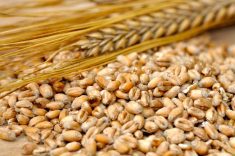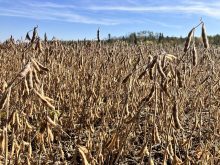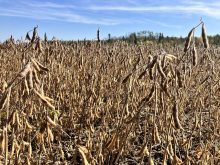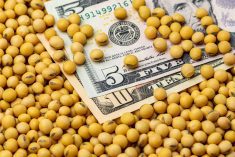A study painting a bleak picture for Canada’s livestock sector under a continued regime of ethanol subsidies and government incentives has drawn blowback from Ontario’s grain growers and the voice of the biofuel industry.
The study, commissioned by the Canadian Cattlemen’s Association, Canadian Pork Council and Canadian Meat Council and authored by the George Morris Centre, Canada’s best-known ag think-tank, said Canadian ethanol production increases the price of feed grains in Eastern Canada by about $15 to $20 per tonne, and in the West by $5 to $10 per tonne.
That increase, according to the study released last week, translates into tighter livestock feeding margins and/or increased losses for Canadian producers, totalling about $130 million per year.
Read Also

Wheat breeding system no longer works, Canadian Wheat Research Coalition report says
A Canadian Wheat Research Coalition report, published Feb. 26, says the status quo is not an option for Canada’s wheat breeding system. It must be transformed, by farmers.
"While it would be naive to claim that grain demand for ethanol production has no effect on commodity prices, it is equally inaccurate to speculate that future ethanol policies will have a detrimental effect on the livestock and meat industries," the Ottawa-based Canadian Renewable Fuels Association (CRFA) retorted in a release Thursday.
"It is the position of the ethanol and grain industries that the contributing factors to the volatility facing the commodities markets are many and cannot be attributed to one industry," the industry group said.
"These factors include the high cost of fossil fuels, currency fluctuations, massive grain buys from emerging markets such as China, and non-commercial market speculators."
Other studies examining both the impact of crude oil prices and biofuels demand on agricultural prices have found "oil prices are the more influential factor," the CRFA said.
The CRFA and the Guelph-based Grain Farmers of Ontario (GFO) said the Morris Centre’s report "drew grossly overstated conclusions from (the authors’) data.
"Their theories which (identified) ethanol policies in Canada as one of the main factors behind challenges facing the livestock and meat industries lacked foundation, and perhaps most importantly, peer review."
"The same farmers"
"There are so many examples of erroneous information in (the Morris Centre’s) report that I am disappointed Canadian livestock producers would choose to point a finger at the ethanol industry as the culprit for lost revenue," GFO chairman Don Kenny said in a separate release last week.
"Many of my neighbours with livestock are also enjoying high grain prices, so we are talking about the same farmers here."
A third of the corn used for ethanol becomes livestock feed through distillers’ grains, an ethanol byproduct, so "the effect of the ethanol industry in Ontario on our feed supply is negligible," the GFO said.
"In fact the George Morris Centre report actually shows that livestock production has been maintained in recent years and livestock prices have been at or near record-high levels despite the growth of the ethanol industry."
Moreover, the GFO said, "corn yields in Ontario are growing at a rapid rate and without the ethanol industry to take the corn, there would be a significant glut in the market with a detrimental impact on corn farmer income."
The rise in corn production since 2000, the GFO said, is "almost equivalent to the increased amount of corn going for ethanol production."
And where the study alleges unfair competition between livestock and ethanol grain buyers due to government subsidization and tariffs, the GFO said, "grain farmers in Ontario are not protected from an influx of American corn by a tariff. In addition, subsidies are not unique to the ethanol industry."
Kenny also urged Canadians to consider the benefit of ethanol from "the big picture (and) not through the single lens of livestock production," specifically noting the five per cent ethanol mandate cuts Canada’s greenhouse gas emissions by over two million tonnes a year, about equal "to taking 440,000 cars off the road."
The GFO said it would rather "work co-operatively with the livestock industry in pursuit of solutions that will raise the value of the whole agricultural industry."
Related story:
Higher ethanol blends would hit livestock sector: study, Feb. 1, 2012















